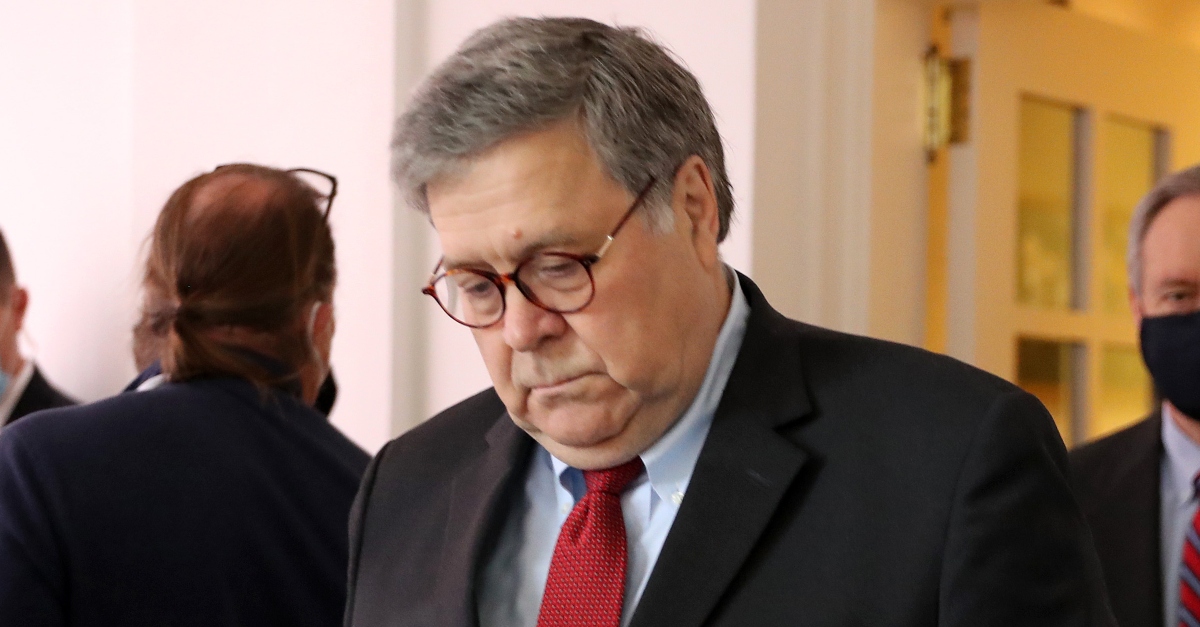
When it comes to the Mueller Report, Joe Biden’s Justice Department is trying to ensure that some of the work of Donald Trump’s Justice Department remains a secret. On Monday evening, the Biden DOJ appealed a federal judge’s ruling which ordered the release of a 2019 legal memo cited by then-Attorney General Bill Barr as the reason the DOJ would not pursue obstruction charges against then-president Trump following the release of the Mueller Report.
In a pair of court documents, the DOJ said it would oppose a lower court’s order, issued earlier this month, contending that portions of the document remained covered by the deliberative process privilege, a form of executive privilege protecting the process by which an agency decision or policy was reached. A page and a half of the memo, the portion which the DOJ is not challenging on appeal, was also released Monday night.
The Biden administration’s decision is likely to disappoint Trump critics, who for years have been calling for increased transparency and accountability for what they widely viewed as Barr using the DOJ to provide political cover for Trump’s efforts to stymie former special counsel Robert Mueller’s probe into Russian election meddling.
After Mueller released his findings to the DOJ in March 2019, Barr infamously purported to “summarize the principal conclusions” in a letter to congressional leaders that condensed the nearly 400-page report into “less than four pages.” Barr concluded that the evidence uncovered in the investigation did not support charging Trump with obstruction.
The nonprofit government watchdog Citizens for Responsibility and Ethics in Washington (CREW) “immediately fired off” a Freedom of Information Act (FOIA) request for any records related to Barr’s considerations. The DOJ denied the request and CREW sued, alleging wrongful withholding of various records not subject to FOIA exemptions.
U.S. District Judge Amy Berman Jackson on May 4 penned a scathing 41-page order accusing Barr’s DOJ of misrepresenting the content of the Office of Legal Counsel (OLC) memo and directed the government to make the document public.
“[Barr’s] characterization of what he’d hardly had time to skim, much less, study closely, prompted an immediate reaction, as politicians and pundits took to their microphones and Twitter feeds to decry what they feared was an attempt to hide the ball,” Jackson wrote.
Jackson reasoned that the memo was “predecisional” and not covered by the deliberative process privilege “because the materials in the record, including the memorandum itself, contradict the [DOJ’s] assertions that the decision-making process they have identified was in fact underway” and “the record supplies reason to question whether the communication preceded any decision that was made.”
The DOJ on Monday conceded that its conduct may have inadvertently caused “confusion” but contended that the department would suffer “irreparable harm” if the OLC memo was released in full (without redactions).
“On the merits, the Court’s decision was substantially premised on the view that the government’s briefs and declarations incorrectly described the nature of the decisional process in which the Attorney General was engaged,” the Merrick Garland-led DOJ’s argument stated. “In retrospect, the government acknowledges that its briefs could have been clearer, and it deeply regrets the confusion that caused. But the government’s counsel and declarants did not intend to mislead the Court, and the government respectfully submits that imprecision in its characterization of the decisional process did not warrant the conclusion that [the OLC memo] was unprotected by the deliberative process privilege.”
Judge Jackson on Tuesday morning released in its entirety her own previously redacted memorandum opinion which discussed the portions of the OLC memo released by the DOJ Monday evening. The government did not oppose the unredacted release of Jackson’s May 3 memorandum opinion.
CREW President Noah Bookbinder said the organization was “deeply disappointed” with the DOJ’s decision to oppose the release of the unredacted OLC memo.
“The Department of Justice had an opportunity to come clean, turn over the memo, and close the book on the politicization and dishonesty of the past four years. Last night it chose not to do so,” he said in a statement Tuesday morning. “In choosing to fight Judge Jackson’s decision, the DOJ is taking a position that is legally and factually wrong and that undercuts efforts to move past the abuses of the last administration. We will be fighting this in court.”
Bookbinder also opined that the portions of the memo which were released provided “further evidence that Attorney General Barr’s efforts were not aimed at making any real legal determination, but were instead aimed at publicly spinning the damning findings of the Mueller Report into a vindication of Donald Trump.”
Read the DOJ’s full memo below.
[image via Chip Somodevilla_Getty Images]